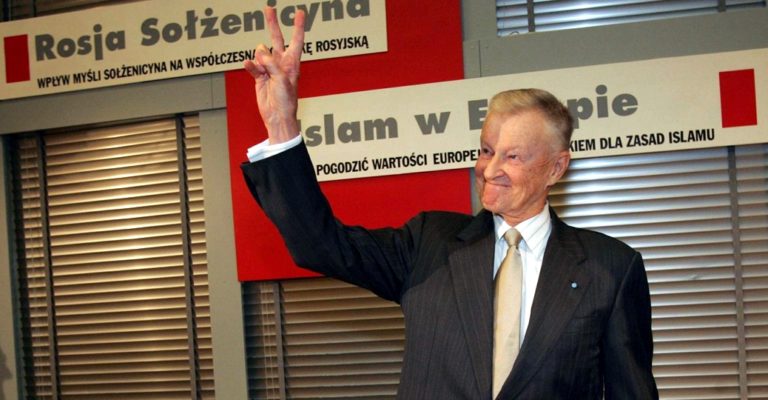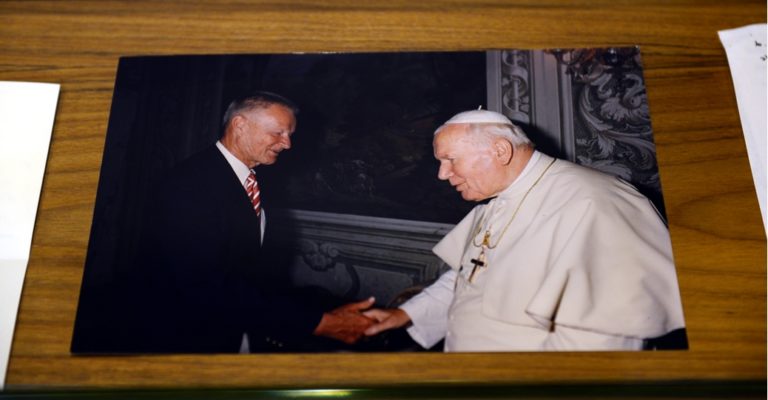
95 years ago, on March 28, Zbigniew Brzezinski was born; a great Pole, a great American, and an outstanding strategist who made immense contributions to the freedom and security of Poland, as well as the transformation of all Central and Eastern Europe. He was also a co-founding father of the Polish-American Freedom Foundation.
Zbigniew Brzezinski was born in Warsaw in 1928. In 1938 he moved with his family to Montreal where his father, Tadeusz Brzeziński, a lawyer and diplomat, took the post of the consul general.
He studied political science and economics at McGill University in Montreal, and subsequently received a doctorate from Harvard University. He established the Institute for International Change at Columbia University, New York and became its first Director. From 1960 to 1989 he served as a professor at several American universities, including Harvard, Columbia, and Johns Hopkins. For over three decades he was engaged in the work of the Center for Strategic and International Studies, in Washington, D.C.
In the 60s, as a leading expert on communism, he was involved in John F. Kennedy’s presidential campaign and later with Lyndon Johnson’s. From 1977 to 1981 he served as the National Security Adviser to President Jimmy Carter where he had a strong impact on US foreign policy, attaching particular attention to human rights in Eastern Europe, an important factor in strengthening the dissident centers in the region. He played a critical role in building American support for the Polish “Solidarity” movement and in preventing a Warsaw Pact’s military invasion of Poland in December of 1980.
For the ensuing years he continued his strong involvement in Polish affairs, cooperating with leaders of the Polish-American community, remaining in close contact with Pope John Paul II, supporting Radio Free Europe and working with Jan Nowak-Jeziorański on a daily basis.
After communism was overthrown - to which he significantly contributed - he actively supported the transformation in Poland, as well as in other countries of the region. Thanks to his vast knowledge, experience and contacts he was able to gain the support of the United States’ authorities for Polish reforms. He was the advocate of establishing the Stabilization Fund, reducing Polish foreign debt, as well as introducing American programs of expert support for the development of a market economy in Poland. He was among the initiators in establishing the Polish-American Enterprise Fund and was appointed to its Board of Directors. Since 1990 the Fund supported nearly 100,000 Polish entrepreneurs. In 1999, the Fund was presented with the Special Economic Award of the President of Poland “for its significant contribution to the development of the Polish economy”. After the Enterprise Fund had completed its mission, Professor Brzeziński made effective efforts to ensure that the money generated by the Fund continued to benefit Polish society. As a result, the Polish-American Freedom Foundation was established and launched its operations in 2000.
Zbigniew Brzeziński played an extraordinary role in safeguarding security for a free and democratic Poland. He actively worked for NATO’s enlargement and Poland’s membership in the Alliance; it is, to a great extent, thanks to his tireless efforts that Poland today has strong security guarantees and belongs to the Euro-Atlantic community of nations sharing the same values.
For his immense contributions to the development of Polish-American relations he was presented with the Order of White Eagle by President Lech Wałęsa in 1995. Before that, in 1981, he received the Presidential Medal of Freedom, the highest civilian award of the United States.
Professor Brzeziński’s contributions to the Polish-American Freedom Foundation cannot be overstated. He was deeply involved in establishing the Foundation and initiating its programs, and as a member of the Board of Directors he helped guide us with his remarkable knowledge and experience. We could always count on his wisdom, advice and friendship.
„An American whose heart remained in Poland" – as he wrote about himself in the introduction to his book „Power and Principle: Memoirs of the National Security Adviser, 1977–1981". He will always be remembered as such by us.


